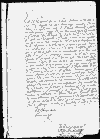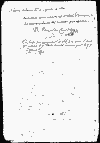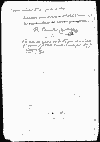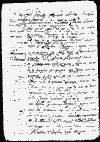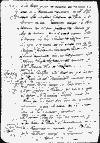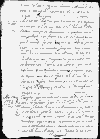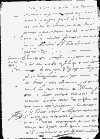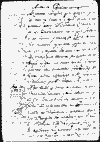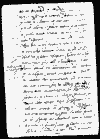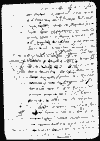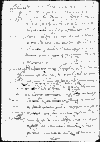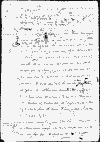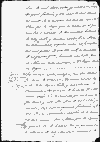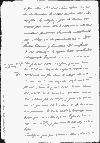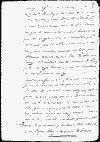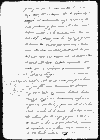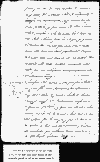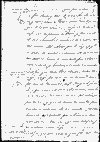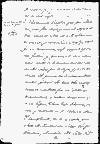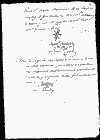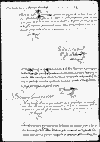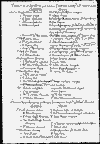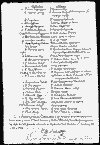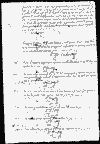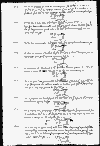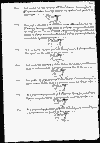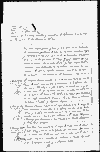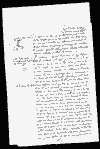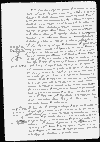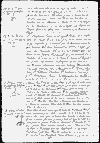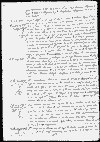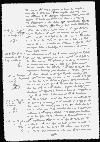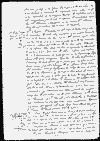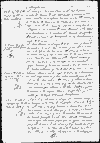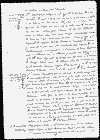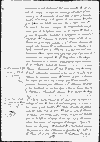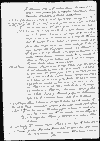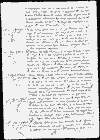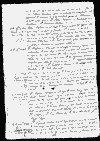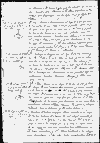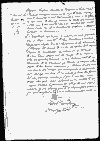
5.223
Lennan, Father (Francis) Fran(cis)co
Natchez, (Mississippi)
to (Bishop Luis Penalver y Cardenas
New Orleans, Louisiana)
Summary of the census of the parish church of Natchez for the year 1795 including the whole province of Natchez with the exception of the District Villa Gayoso. There are 510 white men aged 1-15 years and 919 15 years and over; free mulatto and negro men 1 aged 1-15; 3 15 years and over; male slaves 322 aged 1-15 years and 799 15 years and over making a total of 2554 men. Of white women aged 1-15 years there are 404 and aged 15 years and over, 708; free mulatto and negro women, 2 aged 15 and over and of female slaves there are 433 aged 1-15 years and 459 15 years and over; a total of 2002 women. Forty persons have fulfilled their Easter duty. The church has no steady income. It is necessary to put a fence around the cemetery; it would be good to have a canopy and monstrance. It would be for the spiritual good of the parishioners if a school could be founded from the royal treasury. Except those employed by the government there are only 40 men of the first age (the first group ?) who are Catholics and 85 of the second and third. Of the women 30 of the first age (the first group ?) who are Catholics and 48 of the second and third. Note: Of the total 4556 souls, 4333 are Protestants of various sects. Eleven have been converted to Catholicism since Lennan took over the parish.
IV-5-h A.D.S. 1p. 4to. (Spanish)
2
(1796 Apr. 1)
(Penalver y Cardenas, Luis, Bishop)
Proceedings for having executors present wills for examination.
--------
1795 Aug. 26
Penalver y Cardenas, Luis, Bishop of
New Orleans, (Louisiana)
Through his visits and other sources, Penalver finds that clauses in wills concerning anniversaries, Masses for the dead or legacies for religious purposes have not been sent to the parish so that it is not possible to know whether they have been fulfilled. Penalver orders Pedro (Pedesclaus) Perez Claus, Francisco (Broutin ?) Brusein and Carlos Ximenez, the only ones who keep legal records in the city, to declare the names of those whose wills have been executed since January 1, 1790, noting the Masses and legacies for religious purposes and the executors and heirs. 8
1796 Apr. 1
Lennan, Father (Francis) Fran(cis)co
Natchez, (Mississippi)
to (Bishop Luis Penalver y Cardenas
New Orleans, Louisiana)
Summary of the census of the parish church of Natchez for the year 1795 including the whole province of Natchez with the exception of the District Villa Gayoso. There are 510 white men aged 1-15 years and 919 15 years and over; free mulatto and negro men 1 aged 1-15; 3 15 years and over; male slaves 322 aged 1-15 years and 799 15 years and over making a total of 2554 men. Of white women aged 1-15 years there are 404 and aged 15 years and over, 708; free mulatto and negro women, 2 aged 15 and over and of female slaves there are 433 aged 1-15 years and 459 15 years and over; a total of 2002 women. Forty persons have fulfilled their Easter duty. The church has no steady income. It is necessary to put a fence around the cemetery; it would be good to have a canopy and monstrance. It would be for the spiritual good of the parishioners if a school could be founded from the royal treasury. Except those employed by the government there are only 40 men of the first age (the first group ?) who are Catholics and 85 of the second and third. Of the women 30 of the first age (the first group ?) who are Catholics and 48 of the second and third. Note: Of the total 4556 souls, 4333 are Protestants of various sects. Eleven have been converted to Catholicism since Lennan took over the parish.
IV-5-h A.D.S. 1p. 4to. (Spanish)
2
(1796 Apr. 1)
(Penalver y Cardenas, Luis, Bishop)
Proceedings for having executors present wills for examination.
--------
1795 Aug. 26
Penalver y Cardenas, Luis, Bishop of
New Orleans, (Louisiana)
Through his visits and other sources, Penalver finds that
clauses in wills concerning anniversaries, Masses for the dead or
legacies for religious purposes have not been sent to the parish so
that it is not possible to know whether they have been fulfilled.
Penalver orders Pedro (Pedesclaus) Perez Claus, Francisco
(Broutin ?) Brusein and Carlos Ximenez, the only ones who keep
legal records in the city, to declare the names of those whose
wills have been executed since January 1, 1790, noting the Masses
and legacies for religious purposes and the executors and heirs.
8
--------
1795 Oct. 5
Ximenez, Carlos
New Orleans, (Louisiana)
Ximenez as a notary, (cites the wills executed) before Rafael Perdomo, (giving the names of the testators and executors and the amounts left for Masses and religious purposes for the years 1790 and 1794; the same information for the wills executed by himself (Ximenez) for the years 1790, 1791, 1792, 1793, 1794, 1795). (The dates on which examination was made appear in the margin). Ximenez gives three certifications in compliance with the Bishop's decree supported by the Governor General.
A.D.S. (Spanish)
--------
1795 Oct. 31
Broutin, Fran(cis)co
New Orleans, (Louisiana)
Broutin, a notary, (cites the wills executed before him, giving the names of the testators and executors and in some cases the heirs, and the amounts left for Masses and religious purposes, for the years 1790, 1791, 1792, 1793, 1794, 1795. The dates of inspection are given in the margin). Broutin thus fulfills the decree of the Bishop supported by the Governor. He adds in a note that 150 reales are owed him for his search and copying.
A.D.S.
--------
1796 Jan. 19
(Penalver y Cardenas, Luis), Bishop of
New Orleans, (Louisiana)
Since the proceedings concerning the inspection of wills have been many days in the possession of Pedro Pedesclaux, notary, they are to be turned in even if the certifications have not been made. This is certified by Rivas who adds in a note that he notified Pedesclaux of the decree. Pedesclaux replied that he had been working on the certifications and would probably turn them in the following day.
A.D.S. (Spanish)
--------
1796 Jan. 25
(Penalver y Cardenas, Luis). Bishop of
New Orleans, (Louisiana)
The documents mentioned above are to be picked up. Rivas certifies that in obedience to the above decree he went to the home of Pedesclaux who was still working on the certifications.
D.S. (Spanish)
--------
1796 Jan. 26
Penalver y Cardenas, Luis Bishop of
(New Orleans, Louisiana)
Although he intends to demand the certifications from Pedesclaux, since they have those of Ximenez and Broutin, the secretary will draw up a list of the testators and executors and bring it so that what is suitable may be decided. Rivas certifies this decree.
D.S. (Spanish)
--------
1796 Jan. 26
Rivas J(ose)ph M(ari)a de
New Orleans, (Louisiana)
A list of the testators and executors contained in the certifications of Ximenez; a list of the testators and executors contained in the certifications of Broutin written down in compliance with the above decree. (This is Folio 22).
A.D.S. (Spanish)
--------
1796 Jan. 27
Penalver y Card(ena)s, Luis, Bishop
(New Orleans), Louisiana
Since, in spite of the decree, the wills have not been presented for inspection and since according to the certifications of Ximenez and Brutein, it seems that most of the wills refer to Masses and pious bequests, the executors whose names are given in Folio 22 are asked to carry out the bequests within fifteen days and give documentary proof that they have fulfilled them. Rivas certified this decree and in notes that follow he certifies that he made known the decree to each one of the executors named in Folio 22.
D.S. (Spanish)
--------
1796 Apr. 1
Pedesclaux, Pedro
New Orleans, (Louisiana)
Pedesclaux certified that in the wills coming before him since January 1, 1790 up to the present time there are records of Masses and pious bequests and appointments of executors and heirs as follows: (Pedesclaux gives the above information for the years 1790-95. The last marginal note of inspection is dated July 29, 1801). This carries out the decreethe help of the Governor will be asked. This is certified by J(ose)ph M(ari)a de Rivas as Secretary.
D.S. (Spanish)
--------
1795 Aug. 27
Carondelet, (Francisco Luis Hector) Baron de
New Orleans, Louisiana
It is to be done as the Bishop asks for the three notaries.
Zaldivar, the notary adds in a note that he notified Ximenez of the
above decreeand declared that he knew Duarte and saw him talk three times with
the second captain Blandinier; that another time he saw Torres come
in and give Blandinier a paper he brought between two plates that
the officer might not see it as he said. Arellano believed that it
was from the first captain, which the corporal Domingo Dupon could
observe well because his bed was by that of Blandinier.
31. That Francisco Torres appeared and declared that once he
brought some plates to the hospital for Blandinier and took them
back to the negress Mama July and perhaps to Hervieux; he did not
know of any paper in between.
32. That on the 29th, Benito Arellano and Francisco Torres were
cited to appear because their declarations were in disagreement.
Torres ratified what Arellano had stated in his previous
declaration.
33. That Domingo Dupon appeared again and declared he did not
remember whether Torres had brought a paper between the plates, but
that Torres had taken to Blandinier a paper from Hervieux, saying
that Blandinier had to sign a receipt of 100 "pesos" Hervieux had
received from Miranda. Torres went out and Dupon did not know
whether he came back after the receipt.
34. That Torres appeared again and confirmed Dupon's declaration.
35. That on June 27, Manuel Rodriguez, lieutenant of the third
company of the battalion appeared and accepted the appointment of
defender and promised to carry it out faithfully according to the
Royal ordinances. He was asked also to assist the ratification of
the witnesses.
36. That all the witnesses appeared and ratified their
declarations with the exception of captains Hervieux, Blandinier,
Pedro Lefvre on account of the interpreter's disease; Lorenzo
Orduna, then seriously ill, was able to ratify later, on June 29.
37. That on account of the prolonged disease of Tsnardi, the
governor appointed as interpreter the sergeant of dragoons, Juan
Sapia, who accepted it.
38. That on June 30 the captains Hervieux and Blandinier stated
they did not know Duarte whereas it appeared from the preceding
procedures the contrary. Accordingly, they have been cited for a
second declaration.
39. That captain Blandinier ratified that he did not know Duarte.
40. That captain Hervieux stated that he did not know Duarte by
name but that then he remembered who he was. On the 17th of June
in the room of the officer, the captain asked Duarte to buy a pair
of shoes for him and gave Duarte four "pesos." Duarte did not
return the money nor the shoes. The captain did not see him
anymore; that once the captain heard Duarte say he was from Havana
and the reasons why his father wanted him to become a soldier; that
the two papers the captain gave Duarte did not imply any preceding
friendship as he would have done with any other soldier.
41. That Duarte appeared for a second declaration and confirmed
what captain Hervieux declared. He specified that he could not buy
shoes because he was arrested in the same morning. He has the four
"pesos" with him.
42. That the witnesses should appear to be confronted with the
criminal.
43. That Duarte knew Jose Lechuga did not have for him either
hatred or ill will, but denied everything Lechuga declared; that
Lechuga and the two other witnesses cited by him were partial and
when they had a drink, they would talk against anybody. The first
sergeant of his company and the corporal Manuel Bernal could
confirm Duarte's statement. Lechuga stated that the first sergeant
Francisco Vallejo and the chiefs of the company could witness in
his behalf. Lechuga ratified everything he declared before and
said that Duarte's considerations were devoid of any foundation.
Lechuga is ready to prove his remarks.
44. That as the governor knew that the Province was being attacked
by the enemies on the side of S. Juan river, he sent some officers
thither, among whom was Duarte's defender Manuel Rodriguez. This
was notified to the criminal that he might appoint another defender
instead. He did so in the person of the ensign Juan Pierra.
45. That the ensign Juan Pierra appeared on July 2, accepted his
appointment and swore to carry it out faithfully according to the
Royal Ordinances.
46. Confronting of the other seven main witnesses with Duarte.
The latter denied their declarations; they on the contrary
maintained what they had said and that Duarte's criticisms were
without foundation. There was no meeting between the rest of the
witnesses because nothing results from their declarations against
Duarte.
47. That the procedures were handed over to the defender that he
might allege according to the royal procedures and were returned on
July 7 to the attorney-general.
48. Conclusion. the attorney-general asked the penalty of the
gallows for Santiago Duarte according to the article 26, title 10,
Treatise 8 of the ordinances of the army because he was convicted
of sedition and because his criticisms of the declarations of the
witnesses were without justification.
49. That, on July 9, after the mass of the Holy Ghost, the council
of war assembled, presided over by the colonel, Don Bartolome
Morales; the captains Antonio Pascal Regas, Pedro Salcedo, Juan de
las Remedios, Pedro Berrio, Gines de Oliva, and Pedro Carne were
judges. The procedures were read and the defense of the attorney
Juan Pierra. Santiago was taken to the council under good custody
and questioned by the president and the council of voters about the
information obtained against him. The defender Juan Pierra was
present. Santiago did not manifest anything that might lessen his
fault. The reasons presented by the defender were examined. The
criminal was taken back to prison. Before the voting, the
president decided that certified copies concerning the filiation of
the first three witnesses should be inserted.
50. That the voting took place. All agreed that Santiago Duarte
should be hanged.
51. That the declaration of sentence of death followed in name of
the council against Santiago Duarte.
52. That after the council was through, the major assistant
attorney and the notary handed the proceedings to the governor
brigadier Don Juan Nepomuceno de Quesada in his house.
53. That the filiations of the first three witnesses, grenadiers
Jose Lechuga, Pedro Farimoso and Ventura Baus have been added.
54. That the ensign Juan Pierra of the fourth company of the third
battalion of the Regiment of infantry of Cuba, in the defense of
the criminal, after a preamble in which he exposed the ideas of the
present century, alleged that being a talented man, he should have
foreseen the difficulties of the enterprise he has been accused of.
On the other hand the characters of the accused and of the
denouncer should be taken into consideration. Among the first
denouncers the defender considered Farimoso as liable to suspicion
because his predilection for drinking; Lechuga and Baus seemed to
have good conduct. However, they were not free of the weaknesses
of mankind and, having taken a drink, they could have conceived the
sinister idea of denouncing duarte, although nothing of the kind
might be deduced from the procedures. Moreover, nobody deposed to
have seen Duarte talk with the three first witnesses. There was
contradiction between Lechuga and Baus' declarations. The other
witnesses only proved the friendship of Duarte for the French
captains in taking papers for them. Arellano was not a creditable
witness; he was in a penitentiary because he had calumniated his
captain Ramon Monduy. Orduna, another witness, has suffered fits
of madness in his disease. Accordingly, the defender concluded
that, since Duarte was of a noble character, he could not have
devised such an infamous plot. Either he did not fear God or was
innocent. Therefore, the ensign Juan Pierra asked a penalty
corresponding to Duarte's nobility.
55. That by decree of the governor of July 9, the procedures
passed to the auditor of war Jose Ortega, who considered as just
the sentence of the council of war, and he asked Duarte's execution
on July 17.
56. That by decree of the governor of the same day the procedures
should be returned to the major assistant to keep a testimony of
them and send the originals to the captain general.
57. That the captain general by decree of Sept. 17, 1795, at
Havana, ordered the sentence to be executed.
58. That by decree of the governor of Florida of Oct. 2, the
attorney-general was ordered to pass the procedures to the auditor
of war that the latter might determine about the immunity of church
to which Duarte resorted.
59. That the auditor of war stated that the immunity looked for by
Duarte is not valid because his case was excepted in the bull of
Clement XIV on Sept. 12, 1772. However, the formalities specified
in chapters from 6 to 11 of the Royal letters patent of March 15,
1787, should not be omitted. Accordingly, the procedures should be
returned to the captain general that he might decide what is
suitable. Moreover, the formal consignment and delivery of the
criminal should be asked to the Superior Ecclesiastic.
60. That by decree of Oct. 14 the governor ordered the proceedings
back to the attorney-general that he might solicit from the Pastor
Miguel O'Reilly the formal consignment.
61. That the Pastor answered the attorney-general that since his
faculties are very limited, he could not order the formal
consignment. It would be necessary that the attorney-general
demanded it from the superior ecclesiastical tribunal.
62. That the attorney-general Manuel Martinez on Oct. 19, passed
the procedures, a copy of his official letter to the pastor Miguel
O'Reilly and the latter's answer to the governor Juan Nepomuceno de
Quesada.
63. The governor passed on Oct. 30, 1795, the procedures to the
captain general that he might decide what is suitable.
--To this is added a note by Rivas on Feb. 9, 1796, certifying that
the above procedures were drawn up according to the original ones,
as he was ordered to do by decree on Jan. 14, 1796.
IV-5-f D.S. 33pp. 4to. (Spanish)
4




